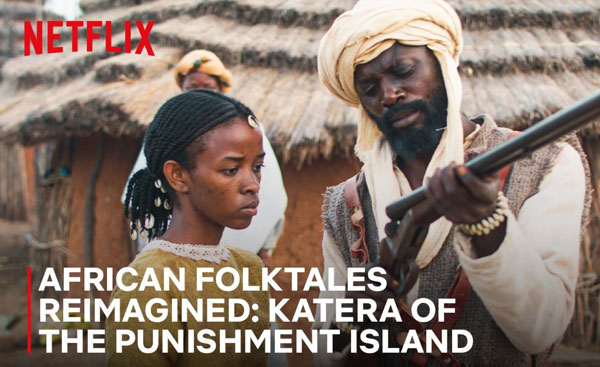
SPECIAL FEATURE | ALL AFRICA.COM – Melody Chironda | Get ready for an adrenalin-fueled ride with Loukman Ali’s latest masterpiece!
In this heart-pumping film, Katera of the Punishment Island, a young woman consumed by grief and left stranded on a deserted island, is determined to seek retribution against the ruthless man responsible for her exile. The plot is so captivating – as the story unfolds, be prepared for a rollercoaster of emotions as the fierce protagonist embarks on a perilous journey filled with suspense and danger, all in the name of justice.
Ali’s film not only provides thrilling entertainment but also sheds light on a brutal cultural practice in Uganda. The Punishment Island, also known as Akampene Island, is a small, remote island on Lake Bunyonyi in southwestern Uganda where young girls who became pregnant out of wedlock were abandoned and left to die as punishment for breaking the strict norms of their communities. The island remains a haunting reminder of this brutal practice and its impact on women’s lives.
It’s incredible to think that such a place exists and was used as a form of punishment for young girls. The fact that this practice was prevalent until the mid-20th century is a stark reminder of the struggles and injustices that women have faced throughout history. It’s essential to acknowledge the impact of such cultural practices on the lives of women and to work towards a more equitable and just society for all.
Melody Chironda had a conversation with filmmaker Ali about his inspiration and challenges in creating a film based on the practice of Punishment Island in Uganda, his message about revenge and redemption, advice for aspiring filmmakers, and hopes for the film’s impact.
Ali grew up in Uganda, where he was surrounded by a rich culture of storytelling. “I was always fascinated by the way stories were told and how they could capture people’s imagination and emotions. As I grew older, I realized that storytelling was not just a form of education but a powerful tool for entertainment, inspiration, and social change. I started drawing comic strips and writing small stories in school and eventually got into film, which allowed me to tell stories visually and reach a wider audience,” he said.
Ali explained that the first time he heard about Punishment Island, he was shocked and fascinated by the brutality and injustice of the practice. “I knew I had to tell this story and shed light on the suffering of the young girls who were left on the island to die.” Through the themes of revenge and redemption, Ali aimed to show the complexity of human nature and the importance of forgiveness and reconciliation. He also wanted to highlight the lasting effects of colonialism and the need for Africans to reclaim their history and culture.
However, he faced numerous challenges while filming in Uganda, including limited resources and logistical issues. He worked closely with local communities and navigated the complex political landscape to ensure that the story was authentic and respectful.
Ali’s advice to aspiring filmmakers is to stay true to themselves and use their unique perspectives to tell stories that are authentic and impactful. He said the importance of researching and understanding the history and culture of their subjects and working closely with local communities to ensure that their stories are respectful and accurate. He hopes that viewers of the film will be moved by the story and the resilience of the young girls who were left on the island. He also hopes that the film will spark conversations about the importance of human rights, gender equality, and social justice.
Ali said how his involvement in the Netflix and Unesco project has enhanced his skills and knowledge as a documentary filmmaker and storyteller. Being part of this project, he said, allowed him to collaborate with other talented filmmakers and learn from their experiences and perspectives. It also gave him a platform to share his own stories, and contribute to a wider conversation about the power of storytelling in creating social change.
Although there are no specific plans for future collaborations between Netflix and Unesco, Ali believes that similar projects could promote cultural diversity and social inclusion. By sharing stories from diverse perspectives, he hopes to foster greater empathy, understanding, and respect for one another.
*****
SOURCE: ALL AFRICA.COM
 The Independent Uganda: You get the Truth we Pay the Price
The Independent Uganda: You get the Truth we Pay the Price



